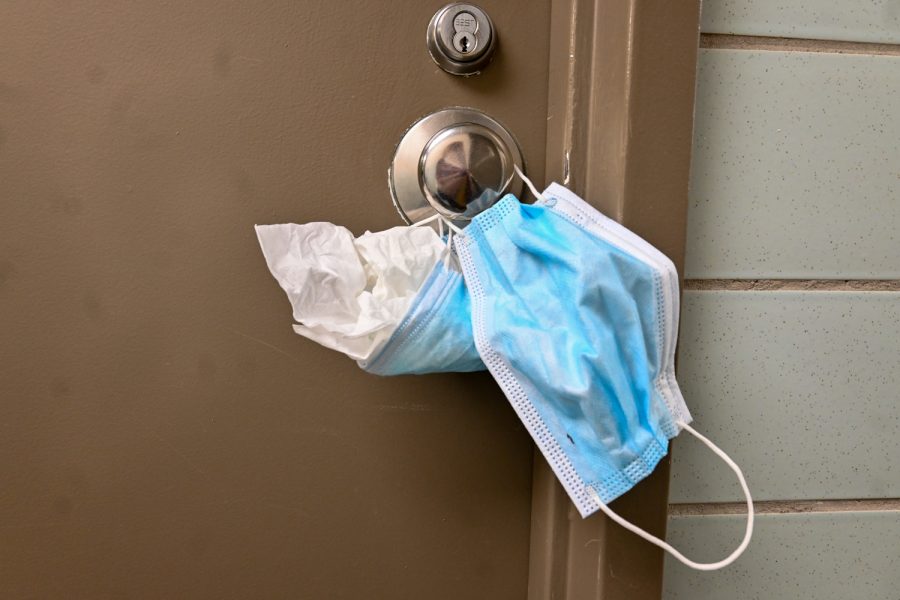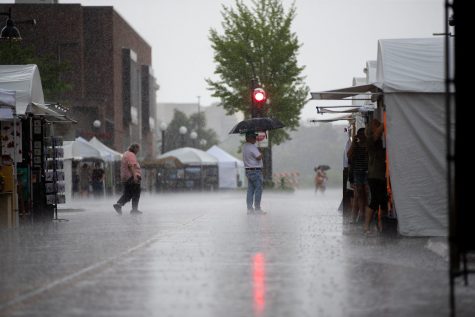Some UI students deterred from residence hall quarantine dorms, unsatisfied with conditions
The amount of students reported to be living in the residence hall quarantine dorms does not match the Johnson County COVID-19 positivity rates. This is because many students are being deterred from the residence hall quarantine dorms and are choosing to go off campus and avoid isolation on campus after hearing others’ experiences.
Photo Illustration by Braden Ernst.
February 8, 2022
University of Iowa students who self-report positive COVID-19 cases say they are avoiding isolating in university quarantine dorms.
According to data reported on Monday, 16 students were in isolation in residence halls.
“I had a friend that went into quarantine at the campus quarantine dorms, and she documented it on her private Snapchat story. I didn’t like the way they handled meals at all,” said Natalie Long, a freshman.
Long, who lives on campus, but chose to quarantine off campus after testing positive, is among the students The Daily Iowan spoke to who decided against entering the quarantine dorms after hearing about them from others.
Any students living in the residence halls who test positive are moved to their respective isolation dorms if they choose on-campus isolation, said Von Stange, assistant vice president for Student Life and senior director for University Housing and Dining.
Long said she was able to go home to Ankeny, Iowa, and isolate there safely, but not all students are able to do the same.
Anudary “Any” Enkhsaikhan, a first-year who spent her isolation period in Slater Residence Hall’s isolation dorms, said she didn’t have the option to return to Glenview, Illinois.
She said she found certain aspects of the isolation spaces irritating.
“I think the school could have provided more meal options because my choices were very limited,” she said. “Sometimes, I just didn’t like the options, so I wouldn’t eat, which made quarantine so much more difficult.”
Stange said the university works to provide what students need to live comfortably in isolation.
“We want to give them a room that is safe, make sure they have access to food,” Stange said. “We have a MicroChill in the room so students who need water can have them and if they’re not hungry at the time, they can refrigerate or microwave their food later.”
She said students spending time in the isolation spaces are given a link with some of the menu items from the dining halls for breakfast, lunch, and dinner. The food they select is delivered twice a day, she said, once between noon and 1 p.m., and another between 5 and 6 p.m.
RELATED: ‘I felt like a guinea pig’: student’s ‘awful’ quarantine experience prompts UI apology
Students also said they struggled to complete online classes while in some of the isolation dorms due to Wi-Fi issues. Alana Hutton said that affected her decision to not go to quarantine housing. Hutton, a UI nursing student, chose to isolate in a hotel in Iowa City instead.
“I take my schooling very seriously,” Hutton said. “I had heard from a friend that Wi-Fi and internet connections were super bad. I was hearing that people couldn’t even log into Zoom for their classes. After hearing that I decided staying in a hotel was best for me.”
This is not the first-time students have reported dissatisfaction with quarantine dorms. In August 2020, one UI student who described the experience as “hell” went viral on social media after posting her experience, including the conditions of her room.
In response, Stange sent out an email to the university community apologizing for the student’s experience and ensuring the experience described was not reflective of the university’s ability to serve its students.
“The experience described does not meet the expectations of the university, Housing and Dining, and most importantly you, the students,” Stange had said in the email. “For that, I am deeply sorry.”
Enkhsaikhan said she thought the quarantine dorms now were better than those described in the 2020 article — however, they could have been better, she said.
Stange said the experience of quarantine has changed and improved over the course of the pandemic.
“The experience we had in August 2020 was obviously coming back the first time since COVID started, so it was our first experience of going through all this, and we were not successful the first time,” Stange said. “Since that time, we’ve worked to improve our communication, to improve our outreach to students.”














